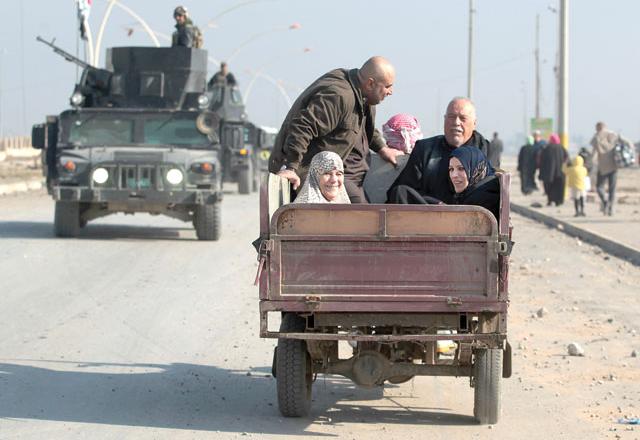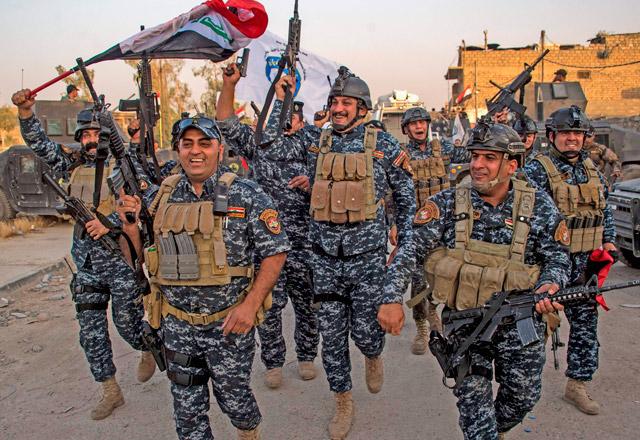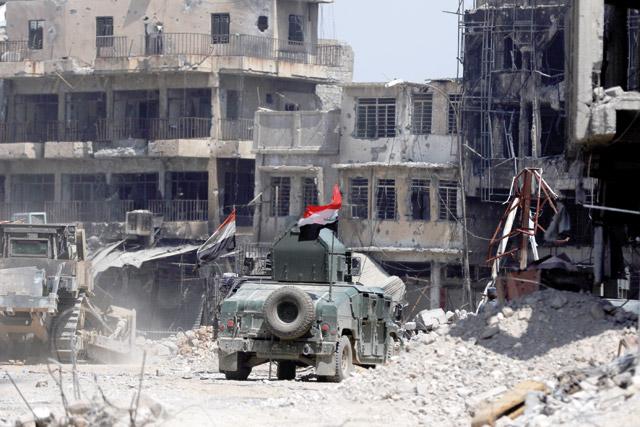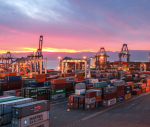You are here
Iraq forces clear east Mosul ahead of push for west bank
By AFP - Jan 19,2017 - Last updated at Jan 19,2017

Iraqis fleeing the fighting between security forces and Daesh militants sit in the back of a lorry as army vehicles drive on a road in eastern Mosul on Thursday, during an ongoing military operation against the extremists (AFP photo)
MOSUL — Iraqi forces battled the last extremist holdout in east Mosul on Thursday after commanders declared victory there and quickly set their sights on the city's west, where more tough fighting awaits.
The announcement that the left bank of the Tigris River that divides Mosul had been retaken was a key milestone in an offensive that began three months ago but could yet last several more.
Staff General Talib Al Sheghati, who heads the Counter-Terrorism Service spearheading the fighting in Mosul, declared the left bank "liberated" at a big press conference on Wednesday.
Iraqi forces were still fighting there on Thursday, flushing out fighters from the Daesh group in northern neighbourhoods east of the river.
According to the Joint Operations Command coordinating the fight against Daesh, federal forces retook a large hotel and a presidential compound. They also recaptured the town of Talkif, further north, which they had besieged for weeks.
Only a handful of areas on the east bank remained to be cleared, including the neighbourhood of Rashidiyah, commanders said.
Prime Minister Haider Al Abadi said around the new year that ridding the country of Daesh, which seized around a third of it in 2014, could take three more months.
He had initially promised to do so by the end of 2016 and many observers have argued his new timetable was still optimistic.
Before Iraq launched its massive offensive against Daesh-held Mosul on October 17, the west bank had always been thought to be where federal forces would meet the toughest resistance.
But elite troops struggled in the east too and only broke the back of the militants there in recent days, after stepped up coordination and increased aerial and advisory support from the US-led coalition.
Once they have fully secured the east coast, Iraqi forces will need to tackle the west bank of the river, which is a little smaller but more densely populated.
Patrick Martin, Iraq analyst at the Institute for the Study of War, said the worst may be yet to come.
“The coalition and the ISF [Iraqi security forces] should plan for western Mosul to be the hardest fight in Mosul,” he said.
“It is denser urban terrain, with older neighbourhoods and narrower streets that will make clearing operations challenging.
“[Daesh] and Sunni insurgent groups also have had historical support zones in western Mosul,” he added, warning that federal forces advancing in the streets could encounter more hostile residents than they have on the eastern side.
The UN estimates about 750,000 people still live on Mosul’s west bank, which includes the old city and key landmarks such as the mosque where Daesh supremo Abu Bakr Al Baghdadi proclaimed his “caliphate” in June 2014.
Colonel John Dorrian, spokesman of the US-led coalition that has dropped close to 10,000 munitions on Daesh targets in the Mosul area since the operation began, said the battle would be tough but argued the extremists had also been severely weakened since October.
Fears for civilians
“They lost a lot of fighters, a lot of resources, a lot of vehicle-borne improvised explosive devices and a lot of weapons during the first half of this battle,” he said.
“The city is for all intents and purposes surrounded so they won’t be able to resupply or reinforce whatever remains,” he explained.
Unlike most of the previous major battles to retake Iraqi cities from Daesh, the current offensive did not empty Mosul of its population.
The UN and other relief organisations had planned for an unprecedented exodus of up to 1 million people but so far about 150,000 civilians have been displaced as a result of the Mosul offensive.
The presence of so many residents in west Mosul as Daesh fights to the death for its last major bastion in Iraq was a concern, however.
“Many families have escaped the horrors of Mosul, but at least 300,000 children remain trapped in the west of the city and now face the prospect of a brutal siege,” said Misty Buswell of Save the Children.
“Children have already paid a heavy price during the battles for the east, with civilians so far making up nearly half of all casualties in the conflict,” she said.
“In the narrow and densely populated streets of the west, in Mosul’s old city, children and their families run an even greater risk of being caught in the crossfire or being hit by bombs.”
Related Articles
MOSUL/ERBIL, Iraq — Iraq’s prime minister declared victory over the Daesh terror group in Mosul on Monday, three years after the militants s
MOSUL — Iraqi forces on Thursday battled the last remaining Daesh extremists in Mosul’s Old City, where the UN said up to 20,000 civilians a
MOSUL, Iraq — The Daesh terror group expelled civilians from their homes along the Tigris on Mosul’s west bank, apparently bracing for a cro


















